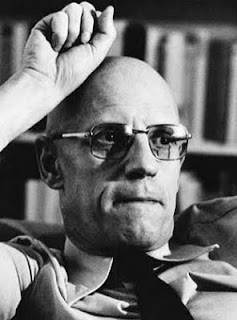
We’re now studying the French philosopher Michel Foucault in our Literary and Cultural theory class and I’m finding it difficult, if not impossible, to read his book: Introduction the History of Sexuality. In fact, I’m not reading it; because it’s crap.
When it comes to philosophy and being a philosopher, Foucault is a tawdry imitation of the real thing. He has nothing to tell me. The word philosophy means: the love of wisdom (Greek: philos, meaning: love; and sophia, meaning: wisdom) and there is no wisdom to be found in Foucault’s writings. His writings are certainly pretentious, verbose, and academic, so that he might appear to have been a philosopher, but I can assure you that he wasn’t.
Although I am not a professional philosopher, I can honestly say that there is more wisdom in my one book than in all of Foucault’s books put together. And for one, simple reason: I believe that love and compassion for others is the only real purpose in life, whereas Foucault believes that the only real purpose in life is the domination and exploitation of others for one’s own purposes and pleasures.
There’s no love of wisdom to be found in his writings; quite the opposite. Philosophy is an art, and the philosopher is an artist who seeks goodness, beauty, and truth. Like someone who urinates on stage or affixes a urinal to a museum wall and calls it art, Foucault’s impure “philosophy” can be likened to excrement. And one does not consider excrement art. If anything, his is an anti-philosophy, or a love of foolishness.
As the late Professor of Literature at Boston University Roger Shattuck has pointed out, in his book Forbidden Knowledge: From Prometheus to Pornography, Foucault embraced the moral nihilism of the Marquis de Sade; from whom we get the terms: sadistic and sadism.
What, then, is Foucault’s great and lasting philosophical accomplishment? To tell us that abusing others physically and sexually—and then killing them—is to live the authentic philosophical life.
Shattuck tells us that “Michel Foucault presents as fundamental for the emergence of the modern era out of seventeenth century classicism the fact that Sade revealed to us the truth about man’s relation to nature. Foucault plants his declarations at crucial junctures in his two major works of 1961 and 1966. These four passages reveal the usually obscured center of his ethos:
‘Sadism . . . is a massive cultural fact that appeared precisely at the end of the eighteenth century and that constitutes one of the greatest conversions of the occidental imagination . . . madness of desire, the insane delight of love and death in the limitless presumptions of appetite.’ (Madness and Civilization, 210)
‘Through Sade and Goya, the Western world received the possibility of transcending its reason in violence . . .’ (Madness and Civilization, 285)
‘After Sade, violence, life and death, desire, and sexuality will extend, below the level of representation, an immense expanse of darkness, which we are now attempting to recover . . . in our discourse, in our freedom, in our thought.’ (The Order of Things, 211)
‘Among the mutations that have affected the knowledge of things . . . only one, which began a century and a half ago . . . has allowed the figure of man to appear.’ (The Order of Things, 386)
The last quotation from the final page of The Order of Things does not allude to Sade by name. But, in association with the other passages and in context, there can be little doubt that the great cultural ‘mutation’ welcomed by Foucault refers directly to Sade’s moral philosophy and to its practice in actual life.” (Forbidden Knowledge, 246-247)